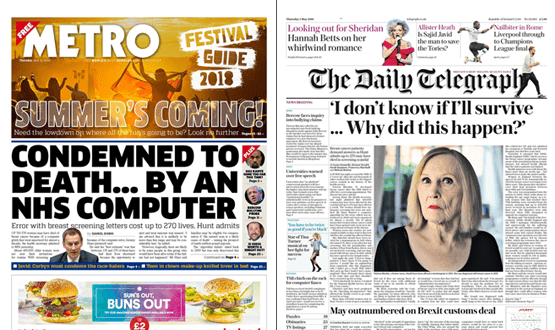National media frenzy follows breast cancer IT scandal announcement
- 3 May 2018

The national media has been sent into a frenzy following the news that an IT error resulted in around 450,000 women missing their final breast cancer screening.
Health and Social Care Secretary, Jeremy Hunt, told MPs on Wednesday that a “computer algorithm failure”, which dated back to 2009, meant the affected group of women were not sent invitations before the cut off point of their 71st birthday.
He said initial estimates, which are based on “clinical modelling rather than patient reviews”, have suggested that between 135 and 270 women may have “had their lives shortened as a result”.
The news made most of this morning’s national newspaper front pages, with The Metro running with the headline “Condemned to death…by an NHS computer” while The Telegraph asked “Why did this happen?” (full list of newspaper front pages listed below).
Thursday's Metro: "Condemned to death… by an NHS computer" (via @hendopolis) #tomorrowspaperstoday pic.twitter.com/0OqFyCgaMR
— BBC News (UK) (@BBCNews) May 2, 2018
Thursday's Telegraph: "'I don’t know if I'll survive. Why did this happen?'" (via @hendopolis) #tomorrowspaperstoday pic.twitter.com/75tD5Zl8kT
— BBC News (UK) (@BBCNews) May 2, 2018
Thursday's Mail: "Betrayal of 450,000 women" (via @hendopolis) #tomorrowspaperstoday pic.twitter.com/OFTDOcBPUz
— BBC News (UK) (@BBCNews) May 2, 2018
Thursday's Sun: "Scandal" (via @hendopolis) #tomorrowspaperstoday pic.twitter.com/sACdYGZ02X
— BBC News (UK) (@BBCNews) May 2, 2018
Thursday's i: "Hundreds died after breast cancer screening failure" (via @hendopolis) #tomorrowspaperstoday pic.twitter.com/or4Px41fj0
— BBC News (UK) (@BBCNews) May 2, 2018
Thursday's Times: "Women wait six months after cancer test failures" (via @hendopolis) #tomorrowspaperstoday pic.twitter.com/uwmmlNUsZC
— BBC News (UK) (@BBCNews) May 2, 2018
Thursday's Express: "Condemned to death by computer glitch" (via @hendopolis) #tomorrowspaperstoday pic.twitter.com/RlFBNmEr5r
— BBC News (UK) (@BBCNews) May 2, 2018
The news also attracted reaction from a number of health-related organisations, including the Royal Collage of GPs.
Professor Helen Stokes-Lampard, chair of the Royal College of GPs, said the implications for GPs “will potentially be significant” as a result of patients seeking reassurance and advice.
She added: “We welcome the independent inquiry into this matter, announced today, but the priority should not be to establish blame, but to put measures in place to invite those women affected for screening, where appropriate; to ensure there are enough resources in the system to cope with any additional demand that might follow as a result; and to take steps to ensure this never happens again.”
Whereas Baroness Delyth Morgan, chief executive at Breast Cancer Now, called it a “colossal systemic failure”.
However Tom Kibasi, director of think tank, the Institute for Public Policy Research (IPPR), tweeted to say it was “profoundly misleading” for Public Health England to “spin” the error as a “computer glitch” and said that a fall in breast screening take up in England should have flagged up concerns (full tweets below).
Profoundly misleading of @PHE_uk to spin this as a “computer glitch”. Public Health England need to start taking responsibility for making a very basic error, failing to properly investigate the observable drop in screening, and failing to grip the problem quickly enough.
— Tom Kibasi (@TomKibasi) May 3, 2018




1 Comments
Just think of those who have been spared unnecessary investigation and treatment harm, though. Greatly outweighs the number of deaths. Quoted letter in recent Daily Telegraph:
“SIR – It is tragic if 270 women died prematurely because they were not called for screening but, according to NHS breast cancer screening statistics, 810 women have been spared unnecessary treatment with surgery, radiation and chemotherapy.
Dr Dora Henry
Stratford-upon-Avon, Warwickshire”
You need to consider the ‘all causes’ death rate, rather than number of breast cancer deaths.
I suspect there might have been a simple coding error – perhaps as simple as <70 rather than <=70.
Comments are closed.